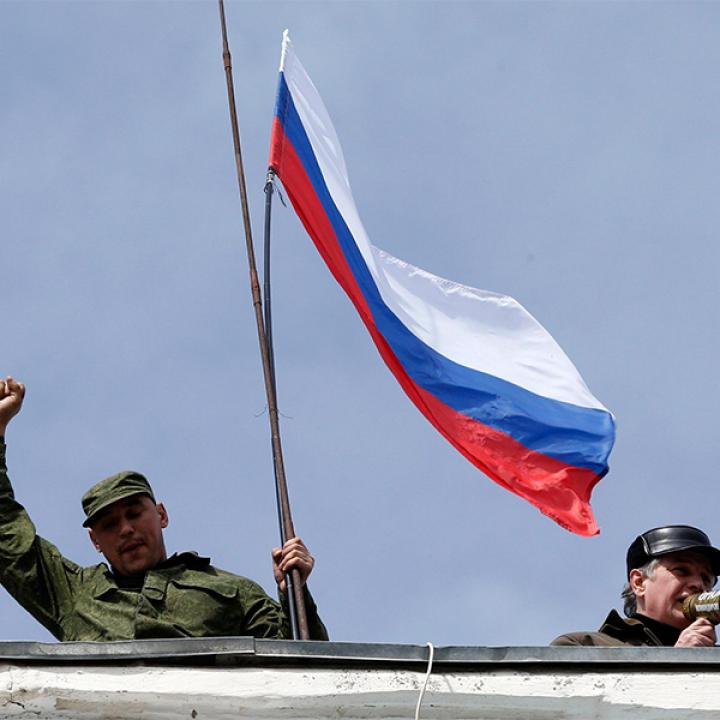
- Policy Analysis
- Articles & Op-Eds
Is Russian Aggression in Crimea an Anachronism or a Harbinger?

The Ukraine crisis is unlikely to usher in a new Cold War, but such developments could seriously jeopardize American interests unless Washington does more to uphold international norms and nurture its alliances.
For some, Russia's invasion of the Crimea heralds a new Cold War. For others, including President Barack Obama, it is an aberration -- a 19th-century outburst at odds with 21st-century standards of behavior. Both are likely incorrect. Rather than a throwback to a bygone era, aggressive actions like Russian President Vladimir Putin's may prove to be this century's norm; so, too, may confused and ineffective Western responses unless we reassess how we conduct our foreign policy.
Fears of a new Cold War are misplaced. Putin's Russia is not as powerful as its Soviet precursor, nor is it the vanguard of a global threat like communism. But the West is also not as purposeful as it was then. Our power and wealth have grown, but are more diffuse than in the past. They are also more difficult to harness. The rising relative strength of our allies, the absence of any overarching perceived threat, and our own reluctance have weakened multilateral coordination.
The same factors have undermined the notion, touted by President Obama, of an international community that shares a set of "principles and norms." In reality, the world is increasingly fragmented geopolitically even as it is more closely bound together by commerce and media. In a world that is no longer bipolar, nations need not "pick sides" in a grand sense but rather band together to suit their interests -- including, sometimes, their common interest in constraining American power.
Norms and principles, meanwhile, are increasingly contested. They're being challenged by Moscow and Beijing, who claim that international rules are tilted against them, and as the NSA debacle demonstrates, they are contested even among close allies like the U.S. and EU, which broadly share a common set of values.
These realities make for a dangerous and unsettled world. Putin's land grab in the Crimea may be brazen, but it is not unprecedented, nor is it likely to be the last such action. China's unilateral declaration of an "Air Defense Identification Zone" in the East China Sea may presage a similar action in the South China Sea, or even bolder steps as it tangles with smaller neighbors over ownership of various shoals and islands.
At the same time, alliances are more fragile. If the Soviet threat provided the impetus for the Western alliance system, the United States provided its glue through assistance, presence, and leadership. Our security architecture in Europe, the Middle East, and Asia survived the end of the Cold War, to be employed against new threats such as terrorism and proliferation. But it will not survive the withdrawal of American leadership.
Indeed, American leadership remains vital to stability and prosperity globally. As no other great power is ready or willing to assume our role, a leadership vacuum will be filled with conflict as other powers jockey for local preeminence. But the realities of expanding commitments, declining resources, and reluctant allies mean that we must lead more efficiently and intelligently.
The keys to doing so lie in exploiting factors that amplify American power. The first of them is, yes, norms and principles. Our interest in others adopting such rules is obvious. But it is not enough to exhort them to do so. We must be prepared to act not only to enforce them when they are trespassed, but to demonstrate that their benefits are shared equally and not exclusive to great powers.
President Obama unwittingly encapsulated the challenge of upholding norms even as he extolled them in addressing the Crimea crisis from the margins of a nuclear security summit. Ukraine, upholding proliferation norms, ceded its nuclear weapons in exchange for guarantees of its territorial integrity, only to see great powers ignore those guarantees in favor of more immediate national interests. Principles are meaningful only when acted upon.
Second, we must nurture our alliances, which are our most important national security asset. When we share interests, allies can act in our stead or in concert with us, reducing our risks and burdens. We must balance the pursuit of our own agendas -- including the advancement of norms -- against the interests of our allies.
Respecting the latter will provide us with the capital and credibility needed to secure cooperation with the former. Nowhere is this more clearly illustrated than in the Middle East, where our agenda in Iran, Syria, and elsewhere has diverged from our allies' to the extent that whatever short-term successes we enjoy may be more than offset by the strategic losses we incur as alliances erode.
Robust international norms and strong alliances can obviate the need for action. But when action is needed, it should be taken early, when problems are smaller and often easier to resolve via diplomacy rather than force. As problems like Syria, Ukraine, and Iran go unaddressed, they metastasize and become unmanageable. Avoiding such outcomes requires not only decisiveness, but strategic planning to foresee problems and put in place policies to forestall them.
We do not yet know whether the Crimea crisis will serve as a template or as a wake-up call for American foreign policy in the 21st century. If it is to be the latter, we must devise new strategies for exercising American leadership amid today's realities, and make the investments in our military and diplomatic capabilities to ensure their success.
Michael Singh is managing director of The Washington Institute and a former senior director for Middle East affairs at the National Security Council.
Foreign Policy


